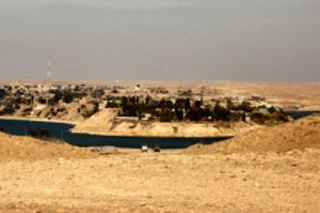The region today known as Iraq was once known as Mesopotamia, which means "Land Between the Rivers," and since that ancient time the land between the Euphrates and Tigris rivers has been renowned for its fecund soil and thriving farms. But now the
Mesopotamian cradle of civilisation seems to be returning to desert [New Scientist].
Decades of war and mismanagement, compounded by two years of drought, are wreaking havoc on Iraq's ecosystem, drying up riverbeds and marshes, turning arable land into desert, killing trees and plants, and generally transforming what was once the region's most fertile area into a wasteland.... "We're talking about something that's making the breadbasket of Iraq look like the Dust Bowl of Oklahoma in the early part of the 20th century" [Los Angeles Times]
, said Adam L. Silverman, a social scientist with the U.S. military.
It hasn't been scientifically proved that tank movements in the ...














